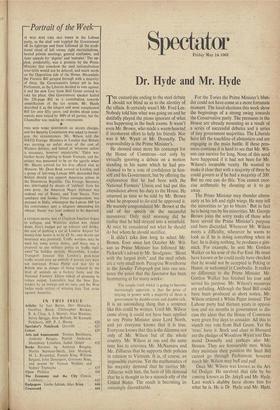Dr. Hyde and Mr. Hyde
TFIE custard-pie ending to the steel debate should not blind us as to the identity of the villain. It certainly wasn't Mr. Fred Lee. Nobody told him what was going on and he dutifully played the piano ignorant of what was happening in the back rooms. It wasn't even Mr. Brown, who made a warm-hearted if incoherent effort to help his friends. Nor was it Mr. Wyatt or Mr. Donnelly. The responsibility is the Prime Minister's.
He showed once more his contempt for the House of Commons—not only by virtually ignoring a debate on a motion standing in his name which he had pro- claimed to be a vote of confidence in him- self and his Government, but by offering the explanation that he had been with the National Farmers' Union and had put this attendance above his duty .to the House. He returned in time to be told by Mr. Brown what he proposed to do and he approved it. He warmly congratulated Mr. Brown at the end of his speech on the successful manoeuvre. Only next morning did he realise that he had strayed into a minefield. At once he considered not what he should do but whom he should sacrifice.
It didn't take him long to select Mr. Brown. Ever since last October Mr. Wil- son as Prime Minister has followed Mr. Pickwick's advice to Mr. Snodgrass : 'Shout with the largest mob,' and the steel rebels are a very smaJ1 mob. Peregrine Worsthorne in the Sunday Telegraph put into one sen- tence the point that the Spectator has been hammering at for many weeks : The simple truth which is going to become increasingly apparent, is that the price of staying in power with a majority of three is government by double-cross and double-talk.
It is an astonishing thing that a sentence like this could be Written. Until Mr. Wilson came along it could not have been applied to any Prime Minister since Lord North, and yet everyone knows that it is true. Everyone knows that this is the dilemma not only of Mr. Wilson but of the whole country. Mr. Wilson at one and the same time has to convince Mr. McNamara and Mr. Zilliacus that he supports their policies in relation to Vietnam. It is, of course, an impossible exercise. Yet the mathematics of his majority demand that he carries Mr. Zilliacus with him, the facts of life demand that he is thought to be a staunch ally of the United States. The result is becoming in- creasingly discreditable. For the Tories the Prime Minister's blun- der could not have come at a more fortunate moment. The local elections this week show the beginnings of a strong swing towards the Conservative party. The pressures in the House are already mounting as a result of a series of successful debates and a series of tiny government majorities. The Liberals have left the touchline of abstention and are engaging in the main battle. If these pres- sures continue it is hard to see that Mr. Wil- son can survive for long. None of this need have happened if it had not been for Mr. Wilson's incurable vanity. He wanted to make it clear that with a majority of three he could govern as if he had a majority of 200. But no one can do this. You cannot exor- cise arithmetic by shouting at it to go away.
The Prime Minister may thunder altern- ately at his left and right wings. He may tell the minorities to 'go to blazes.' But in fact he is being run by his minorities. Mr. George Brown joins the sorry ranks of those who have served the Prime Minister's purpose and been discarded. Whenever Mr. Wilson meets a difficulty, whenever he wants to look as if he is doing something when in fact he is doing nothing, he produces a gim- mick. For example, he sent Mr. Gordon Walker on his tour of the Far East. He must have known or he could easily have checked that he would not be accepted in Peking or Hanoi, or welcomed in Cambodia. It makes no difference to the Prime Minister. Mr. Gordon Walker has finished his tour and served his purpose. Mr. Wilson's resources are unfailing. Although the Steel Bill could have been produced at short notice, Mr. Wilson ordered a White Paper instead. The Labour party had thirteen years in opposi- tion and six months in government to dis- cuss the ideas that the House of Commons were given five days to consider. All this to snatch one vote from Hall Green. Yet the `noes' have it. Stark and clear in Hansard are the pledges of Woodrow Wyatt and Des- mond Donnelly and perhaps also Mr. Strauss. They are honourable men. While they maintain their position the Steel Bill cannot go through Parliament, however much Mr. Wilson may huff and puff.
Once Mr. Wilson was known as the Art- ful Dodger. He survived that title by be- coming known as Dr. Jekyll and Mr. Hyde. Last week's shabby farce shows him for what he is. He is Dr. Hyde and Mr. Hyde.


































 Previous page
Previous page